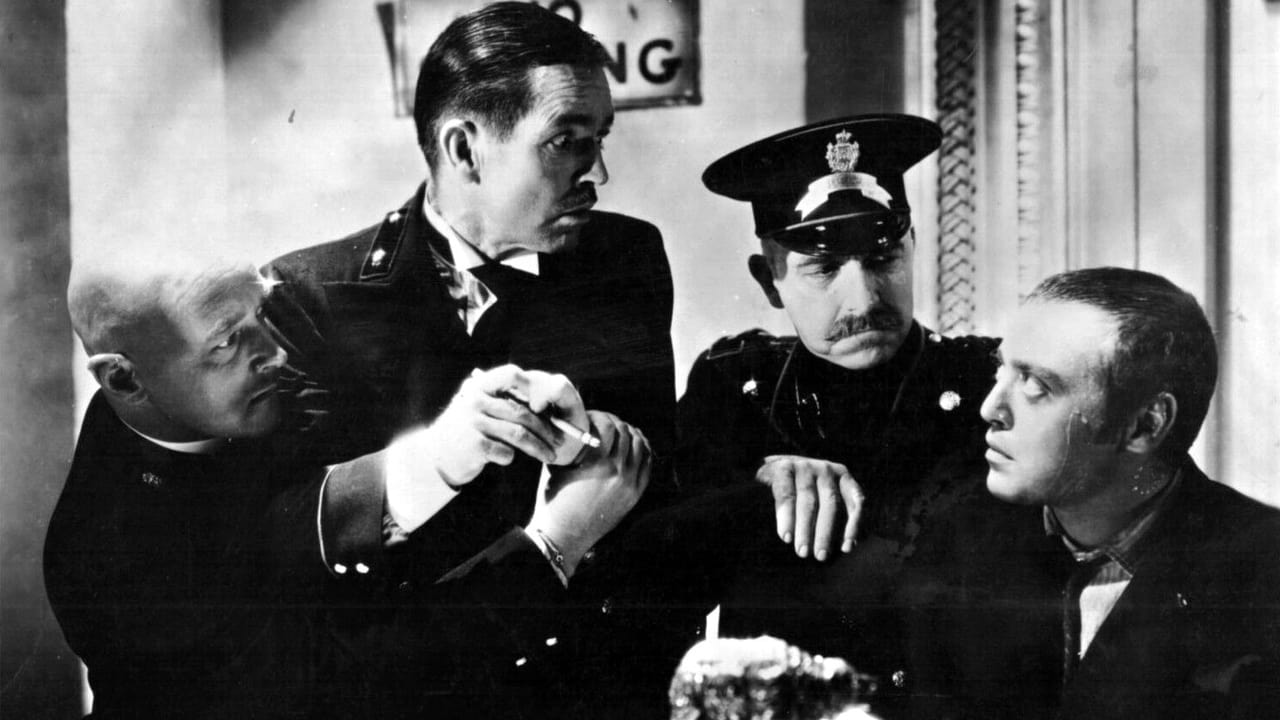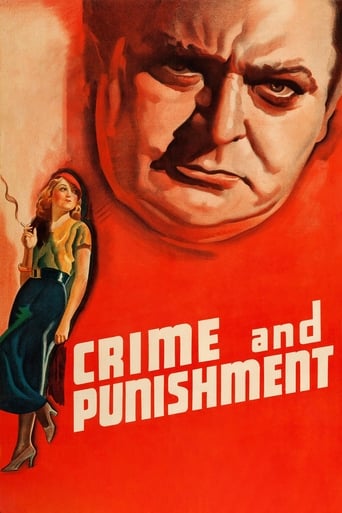

Truly Dreadful Film
... View Moregood back-story, and good acting
... View MoreIt's the kind of movie you'll want to see a second time with someone who hasn't seen it yet, to remember what it was like to watch it for the first time.
... View MoreThis is a small, humorous movie in some ways, but it has a huge heart. What a nice experience.
... View MoreThis rather static and flat telling of Doestevski's classic novel is a turgid affair from the get go. Peter Lorre's Raskanikov is moodily over the top throughout while Joseph Von Sternberg's direction moves his characters listlessly through hazy sets that resemble abandoned buildings. The real crime in this picture is its construction.Raskonikov graduates at the top of his class being singled out for his uncanny ability to deduce with superior insight. It does not translate into a well paying job however and he is soon off to the vile pawnbroker to keep his family above water. At the shop he encounters a streetwalker,getting her fair share of abuse from the pawnbroker and a friendship ensues. Raskonikov furious of the inequity between his decent friend and the well heeled harridan decides to off her. Confident that his superior intelligence will keep him from getting caught he goes through with it but comes up against a worthy adversary inspector Poriphy and the battle of wits begins. Raskonikov is also fighting on a second front with his conscience.Without meal ticket Marlene and big studio Paramount's production values director Josef Von Sternberg's future got a good look at it with this stilted interpretation of minimalist set decoration and haphazard lighting. With the exception of a few scenes isolating Lorre this early master of light and shadow goes from artist to house painter with drab tableaux in a fog. Lorre is all over the place and his erratic lead lurches to and fro while a becalmed inspector, effectively performed by Edward Arnold, gives him more than enough rope to seal his fate. The underrated Marian Marsh as Sonya also shines but with Lorre chewing scenery in large bites and Von Sternberg without his Paramount perks Crime and Punishment has you doing time.
... View MoreDirector Josef von Sternberg had a long and distinguished career interrupted by "Crime and Punishment." Among his stellar performances are "The Blue Angel," "Morocco," "Blonde Venus," and "Duel in the Sun," to mention only a few. Many of his motion pictures starred Marlene Dietrich. In "Crime and Punishment," von Sternberg works with Peter Lorre, Edward Arnold, and Marian Marsh to get this gargantuan novel down to 99 minutes of screen time. Since I haven't read the novel, I have no clue what they left out. I'm sure it's a travesty. Since I haven't read the novel, however, I treat the movie on its own merits. I consider of plot of little importance in this movie version. Raskolnikov (played by Lorre) is introduced as a student with great promise. Our next scene shows him impoverished but too proud to accept a loan from a former school chum. Raskolnikov is slowly pawning all his belongings because he has no other means of supporting himself. The pawn broker (played by the famous Mrs. Patrick Campbell) is absolutely appalling, and her murder by Raskolnikov is, if not excusable, at least understandable. The irony is that Raskolnikov is famous in police circles because of his magazine article (for which he was not paid) called "On Crime." In this essay (if I understand the movie correctly) Raskolnikov advances the theory that there are two classes of people: those ordinary people who commit ordinary crimes, and an elite class, including Napoleon, whose crimes are somehow superior and above the law and therefore are not to be punished. The head of police, Inspector Porfiry, meets Raskolnikov and praises his work and asks for his help in solving the murder of the pawnbroker. It is not till this game begins that the movie gets interesting. Until the game between Raskolnikov and Porfiry, Lorre's acting has been random and muddled. In his scenes with Arnold, though, Raskolnikov takes shape and becomes hunted, haunted, angry, brave, cowardly, and a myriad of emotions that play across Lorre's entire body. Arnold is excellent as Porfiry, an old hand at the game of crime, and Porfiry plays the game superbly. In their scenes together, you get to enjoy Porfiry's knowledge that Lorre knows he knows, and we see Lorre's anguish as he realizes Porfiry knows, knows Lorre knows he knows, and we spiral down the hole of madness of he knows he knows he knows.Lorre is superb playing anguished men. I think he was at his best in "M" as Hans Beckert under the thumb of Inspector Lohmann. It's a shame Lorre was type cast as Sidney Greenstreet's sidekick in so many movies. I saw Peter Lorre on a 50s game show. The contestant was a blindfolded woman who was asked to chose which of three men was Peter Lorre doing a love scene with her. Each actor kissed her hand and murmured sweet nothings to her. The other two men were credible imitators, but the woman blurted out, "I want _him_!" as she picked Lorre. She didn't care whether he was the real Lorre or not; he was the man she believed in his lovemaking. Lorre was a great actor whose talent was not much used.
... View MoreFor his first Hollywood movie, Peter Lorre – billed as "the great international star" – personally chose to play the lead in an adaptation of Fyodor Dostoyevsky's masterpiece, although he is curiously second billed to the film's nominal star Edward Arnold (appearing in the film's latter half as his nemesis, the Chief of Police). The film has been justifiably criticized for being a greatly oversimplified and condensed version of Dostoyevsky's mammoth novel but, not having read the book myself, I was satisfied with (and found much to admire in) von Sternberg's typically pictorial direction which highlights Lucien Ballard's atmospheric chiaroscuro lighting. Peter Lorre is perfectly cast as the arrogant genius Roderick Raskolnikov whose tracts on criminology has made him a household word with the police authorities but, perhaps due to an excess of pride, apparently also reduced him to a bottom-of-the-barrel social status; a casualty of the film's ruthless editing of the original source is the fact that Raskolnikov's fall from grace (from a master pupil to a bum) is never properly explained. Meeting up with a lovely gamine (Marian Marsh) at a heartless pawnbroker's and fully confident in his own superiority 'above the law', he soon puts his theories into practice by doing away with the latter; picked up for questioning by the Police, Arnold (also excellent) soon requests his assistance on the murder investigation itself upon learning of Lorre's true identity and, before long, an innocent neighbor (FRANKENSTEIN [1931]'s Michael Mark) is brought before them as the prime suspect. The cast also includes Gene Lockhart (as Lorre's pompous brother-in-law-to-be) and Douglas Dumbrille (as a former employer of Lorre's sister who is now seemingly hounding his steps). Reportedly, von Sternberg did this merely as a contractual assignment and is said to talk disparagingly of it in his famous autobiography, "Fun In A Chinese Laundry"; whatever the case, it was a good start for him after the termination of his celebrated long-running collaboration with Marlene Dietrich. There have been several film adaptations of the Dostoyevsky novel over the years but the most intriguing one that I would like to catch up with is Robert Wiene's 1923 German Expressionist Silent version RASKOLNIKOV which, for better or worse, was recently released on DVD by Alpha under the novel's more recognizable title.
... View MoreJosef von Sternberg's touch looms over CRIME AND PUNISHMENT--the dramatic lighting of shadowy photography, the Dietrich-like close-ups of its female star--but while he has captured the mood of the story with his photography, the film is flawed in many ways.PETER LORRE's performance is uneven, his actions sometimes implausible given that he's supposed to be an expert author of an essay on crime. His sudden bursts of temper to suggest that his conscience is nagging him are almost on the point of burlesque. Von Sternberg should have taken more care in directing Lorre--as much care as he took in lighting MARIAN MARSH for the camera. She looks radiant but is just so-so in performance as the street harlot. ELISABETH RISDON is well cast as Lorre's weak mother.MRS. PATRICK CAMPBELL makes a formidable pawnbroker and an unsympathetic victim of Lorre's crime. EDWARD ARNOLD, who gets top billing, makes a police inspector who is more jovial than crafty with a Santa Claus laugh that would have served him better if he were playing comedy rather than psychological drama.And yet, the story remains a compelling one and the moody atmosphere with its Germanic expressionistic photography is bound to keep a viewer interested in the proceedings.Summing up: Could have been a much better version of a tortured soul with more time spent on developing a plausible central character.
... View More